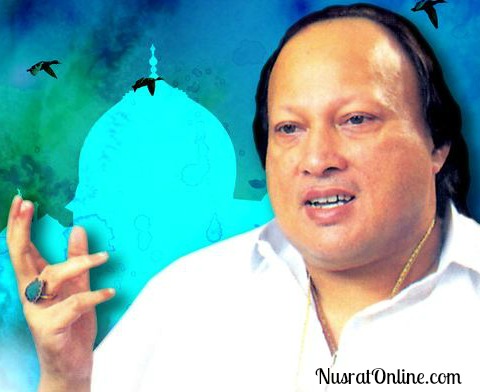Nusrat Fateh Ali Khan Says His Message of Peace Is for Everyone
JIM WASHBURN | THE TIMES
Unlike many popular singers who have wildly animated styles, Nusrat Fateh Ali Khan performs seated, as implacably planted on the stage floor as a bean-bag chair. But though he may be rooted to the spot physically, the Pakistani singer’s voice launches into incredible, propulsive flights of melismatic abandon as he strains to embody the content of his songs, and his hands and arms often gesticulate and fly with the emotion of his singing.
And while Ali Khan and his similarly seated band mates perform, they often find themselves amid a tumultuous sea of motion as adherents of the music become carried away and dance and spin like dervishes.
Indeed, the tradition of dervish dancing has the same Sufi Muslim roots as Ali Khan’s Qawwali music, and both stem from the Sufi mystic’s goal of becoming so enraptured in a performance that one experiences a direct contact with his God. Though he sings in the Urdu language in a millennium-old traditional style, Ali Khan’s voice has found an international audience. Championed by Peter Gabriel, Ali Khan and his Party (his group of singers and musicians, including several relatives) were a sensation in the ’80s at England’s WOMAD Festival. He currently records for Gabriel’s Real World label.
The singer–who is in the midst of teaching a course in Qawwali and Indian classical music in Seattle at the University of Washington–returns to Orange County on Sunday for a performance at Buena Park’s Sequoia Athletic Club. Ali Khan’s local performances in June were sold-out affairs that drew both Indo-Pakistani-Americans and other fans of the music. Language didn’t seem to be a barrier, for, like the great gospel-raised American soul singers, Ali Khan employs unfettered, emotional vocals that illuminate his words more than a dictionary ever could.
Ali Khan, reached by phone in Seattle on Tuesday, explained through interpreters Jeff and Nina Jaffer of Irvine that his music needs no interpreter.
“Our music is not just for the sake of listening, but there’s a message in there that is through Sufism. Before listeners can understand it, they have to like the music first, to be captured by the tempo. Once they get involved that way they want to experience what is in the lyrics. It is like veil after veil lifting. Then they start to understand that this music is Sufism music, with a message in there.
“This message is not only for Muslims, but for the whole world, whatever religion you have. Our message is a message of peace. The message is about humanism, about how human beings should treat other human beings, how we should live. It is a message of love between human beings and Allah. All this comes from the teachings of the great saints like (12th-Century Sufi Mueenuddin) Chishti, who were giving out the message of Allah,” Ali Khan said.
Qawwali music (“Qawwali” means “utterance”) originally was performed on stringed Indian instruments, but now uses harmoniums (a portable hand-pumped organ) introduced to India in the 17th Century. Ali Khan’s party employs two harmoniums, several singers and a \o7 tabla\f7 drum, like those used in Ravi Shankar’s sitar-led music.
The lyrics of the songs often are taken from Sufi poetry, such as those by Persian poet Djelalleddin Rumi. Like Indian ragas, Qawwali songs often follow a formalized mode and then depart into improvisations, during which Ali Khan takes flight, repeating and turning words or phrases through all possible shades of expression.
“It is partially for those who don’t understand the language that I go into the” improvisations, he explained, “because it makes the words reach out. When I start to sing I go into a different level, a different world where I am becoming a representative and passing on the message through the music. All the actions I may be doing are from my heart. I may have to wave my arms to show my pleasure at something, to show that ‘Yes, it has worked. Yes, I am in ecstasy to be the medium of this message.’ That is what I feel.
“Our idea is to put people into a trance, take them to the level we are going into, and pass on the message we have in the singing and the music. We always try to sing from the heart.”
Along with the impassioned dancing, audience members at Ali Khan’s shows often toss currency of all denominations to the stage. Though such a material offering may seem at odds with the lofty sentiments of the songs, Ali Khan explained that it is part of a long tradition. The practice, called \o7 nazrana\f7 , is symbolic of the actions of early Sufis such as Rumi, who were so overcome by the love of Allah that they abandoned their homes and worldly things.
“It is a gift. Even when the prophet Jesus Christ was here, people would give him gifts and food out of their love. These people are giving money for their love of God that we are singing about and that touches them through the aura of our music. We take it as part of \o7 nazrana\f7 , that it is not for us, but in the praise of Allah.”


Join the Legend's Legacy